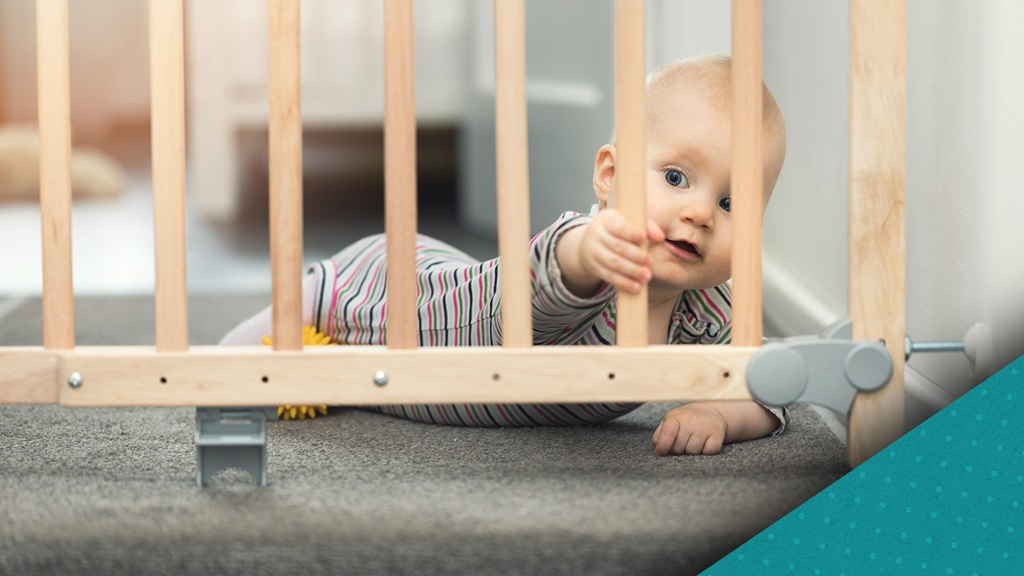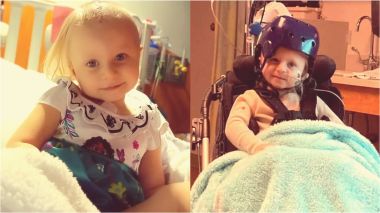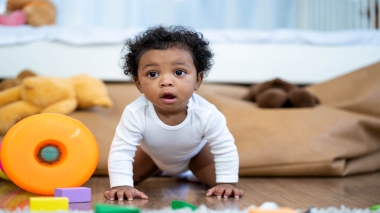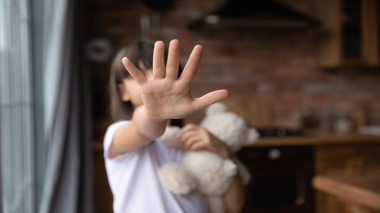Editor’s Note: This is a shortened version of an article featured in Atrium Health Levine Children's “Oh Baby! A trimester-by-trimester guide to pregnancy and newborn care.” To read more, get your free copy of the guide!
From traveling with your newborn to introducing them to loved ones, Diep Nguyen, MD, a pediatrician at Atrium Health Levine Children's Perspective Pediatrics, has some tips to keep your baby safe, sound and out of harm’s way.
Make Your Home a Safe Place
Not sure when to start babyproofing? The rule of thumb is to make sure your home is completely babyproofed before your little one is mobile – usually around 4 to 6 months of age. “When your baby starts crawling, you’ll be so busy trying to keep up with them, it might be hard to babyproof,” says Dr. Nguyen.
Get plugs for outlets, locks for cabinets and secure heavy things that could be pulled down on your baby, like bookcases or dressers. Move chemicals and unsafe products out of reach, put gates on your stairs, and always have the number for your local poison control close by. (Psst. Carolinas Poison Center’s phone number is 800-222-1222.)
Want to make sure you haven’t missed anything? Look at your home from the eyes of an infant. “Sometimes it’s good to just get on the floor and crawl around. You’ll see things at your baby’s eye level that you might not see otherwise,” says Dr. Nguyen. “Look under furniture, too. You might find coins and other small objects that your baby could put in their mouth.”
Put Your Baby in the Safest, Cleanest Hands
When you’re introducing your baby to new people, the key is to make sure everyone washes their hands well – especially young kids, who tend to carry more germs. And don’t let anyone who’s sick or has a fever come by until they’re fully well. “Minimize visitors during flu season, and wait until any high viral season is over,” says Dr. Nguyen.
You might want to spend all your time loving on your newborn, but no one – not even you – should kiss your baby around their eyes, nose or mouth. You have germs before you even know you’re sick that can transfer to your baby. Don’t worry – you can still give your little one plenty of kisses on the forehead, tummy and toes!
Dr. Nguyen also notes the benefits of breastfeeding in helping to build newborn’s immune systems and as an effective way to reduce their risk of serious infections. Here’s how it works: when pregnant women take vaccines they are recommended, such as the flu vaccine, they provide direct protection for mom, but also indirect protection for baby thanks to the transfer of important antibodies in breastmilk. In addition, breastfeeding has been shown to reduce risks of acute gastroenteritis (stomach flu) as well reduce risks for allergic diseases like asthma and atopic dermatitis (eczema).
How to Have a Safe Trip
You know you can’t keep your baby in the safe bubble of your home forever. At some point, you’ll be ready to take your newborn out to explore the world, but how soon is too soon? The answer, of course, depends entirely on what’s best for you and your baby.
It’s typically okay to take a newborn out in public as early as 6 weeks, but Dr. Nguyen suggests waiting a little longer. “I usually recommend waiting until around 8 weeks, after the first set of shots,” she explains. “At this time, your baby will be on a better schedule with naps and is able to handle stimulation and time away from home.”
Whether you’re taking a short drive down the road or planning a longer getaway (Good luck!), it’s crucial to use the right size car seat for your baby’s weight. Also keep in mind that rear-facing car seats are now recommended until age 2.
Tips for Preventing SIDS
Sudden infant death syndrome – or SIDS – is the unexpected, often unexplained death of a newborn. As you can imagine, it’s a big concern for parents, especially when their baby is sleeping because that’s when SIDS usually occurs. Dr. Nguyen has a few tips to help prevent SIDS, starting with how your baby sleeps. “The most important thing you can do to prevent SIDS is make sure your baby is sleeping on their back,” she says.
Although putting blankets, bumpers and stuffed animals in your baby’s crib might seem like a good idea, Dr. Nguyen warns that these three things can all increase a newborn’s risk of SIDS. Bed-sharing can also lead to SIDS, but Dr. Nguyen says that room-sharing can be a safe alternative to prevent it.
“The newest recommendation is to have the baby in your room until at least 6 months and even up to a full year,” she adds. “Room-sharing has been shown to reduce the risk of SIDS, perhaps because parents are present and more aware.”
Playing It Safe
There are certain products out there that might be popular – but aren’t particularly safe. Here are Dr. Nguyen’s thoughts on a few of those products:
- Baby bumpers: “They’re pretty, but they aren’t safe and can increase a baby’s risk of SIDS.”
- Pacifier clips: “These are okay to use when the baby’s awake. But if the baby falls asleep, the clips can potentially go around their neck.”
- Teething rings/necklaces: “These can be a choking hazard if the amber beads are too long or if a bead breaks away.”
- Heart monitors: “They haven’t been proven to help and aren’t always accurate. They could either provide a false sense of security or beep every 5 seconds and make parents anxious for no reason.”
When it comes to keeping your baby safe, you probably have lots of questions – don’t be afraid to ask them. “No question is a dumb question for your provider,” says Dr. Nguyen. “We welcome all kinds of questions, especially for new parents and families.”
Like this article? Want to see more like it? Get a free copy of Atrium Health Levine Children's “Oh Baby! A trimester-by-trimester guide to pregnancy and newborn care”!
Updated 4/12/2023.



